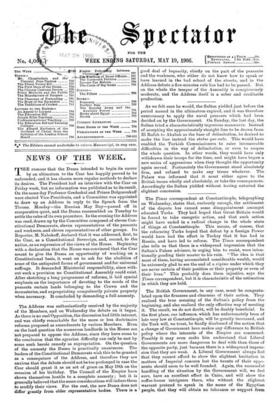NEWS OF THE WEEK.
THE rumour that the Duma intended to begin its career by an ultimatum to the Czar has happily proved to be unfounded, and it has chosen more regular methods to declare its desires. The President had an interview with the Czar on Friday week, but no information was published as to its result. On the same day Professor Gredeskul and Prince Dolgoroukoff were elected Vice-Presidents, and a Committee was appointed to draw up an Address in reply to the Speech from the Throne. Monday—the Russian May Day—passed off in comparative quiet, and the Duma reassembled on Tuesday to settle the rules of its own procedure. In the evening the Address was read, drawn up by the Committee composed of eleven Con- stitutional Democrats, eleven representatives of the peasants and workmen, and eleven representatives of other groups. Its Reporter, M. Nabokoff, declared that it was addressed, first, to the Czar, as a Constitutional Sovereign, and, second, to the nation, as an expression of the views of the House. Beginning with a declaration that the House was convinced that the Czar meant to give the Duma an opportunity of working on a Constitutional basis, it went on to ask for the abolition of some of the antiquated forms of government and for universal suffrage. It demanded Ministerial responsibility, since with- out such a provision no Constitutional Assembly could exist. After sketching a long programme of reforms, it laid special emphasis on the importance of devoting to the needs of the peasants certain lands belonging to the Crown and the monasteries, and expropriating compulsorily private property when necessary. It concluded by demanding a full amnesty.










































